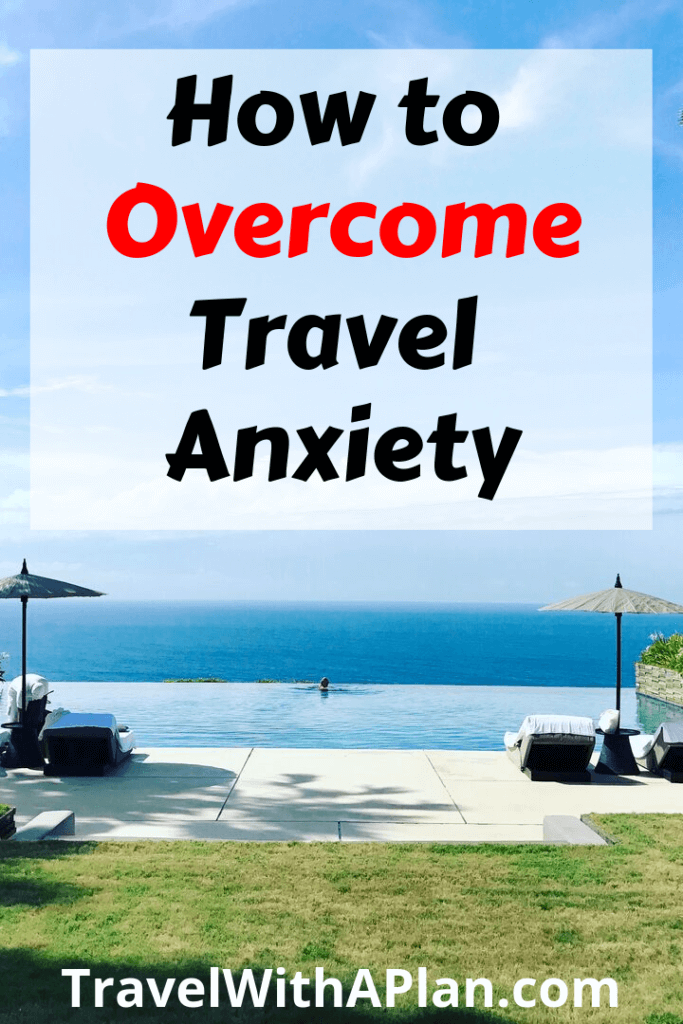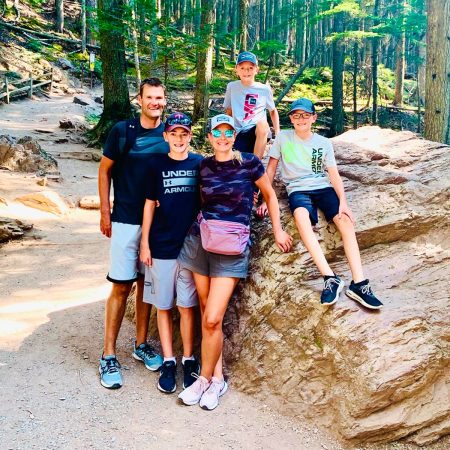This post may contain affiliate links, view our disclosure policy.
Are you wondering how to overcome travel anxiety?
Do you feel anxious at the thought of traveling to a new destination, or perhaps anxious about traveling in general?
Maybe you have a fear of flying, worry about missing home, or feel overwhelming stress related to packing and preparing for travel.
In this post, we’re going to discuss what travel anxiety is as well as review how to overcome the crippling effects of travel anxiety.
Background Info
A condition that is very near and dear to my heart, I do not take the discussion of travel anxiety lightly, nor do I believe that it is as easy to overcome for some as others.
Along with my own research, I have collaborated with Mindset Coach Krista Ryan from KfG Coaching to help answer some of the most common questions surrounding the topic of travel anxiety.
Perhaps you’ll be able to identify with the causes and symptoms of travel anxiety that we will discuss in this article.
My hope is that after reading this, you will feel more equipped to identify, cope with, and overcome travel anxiety or be encouraged to seek out more information.
*Please note that I am not a professional medical provider and that this article is based on personal experience and life coaching.

What is Travel Anxiety
Travel anxiety is a common and complex issue that offers a unique experience for everyone.
Though there is no single cause of travel anxiety, it involves feeling anxious or depressed while preparing for, leading up to, or taking part in travel.
Oftentimes, those with travel anxiety will feel unsettled about being in new and strange places away from the safety net of home.
Meeting new people or experiencing new foods can also make people feel insecure and anxious.
The fear of others witnessing this anxiety may make the situation worse.
Finally, travel anxiety involves feeling anxious for no apparent reason, meaning that there are no current facts to support the way that you are feeling.
Perhaps it is this feeling of despair that has you wondering how to overcome travel anxiety.
Physical Symptoms of Travel Anxiety
Symptoms of travel anxiety can include:
- Excessive fear and/or worry
- Restlessness
- Racing heartbeat
- Shallow breathing/hyperventilation
- Tight chest
- Nausea
- Pacing, constant body movement
- Talking fast
- Dry mouth
Travel anxiety question:
How is travel anxiety different from a basic worry or concern related to traveling?
Mindset Coach answer:
Travel anxiety is different from basic worry or concern in that it involves a more lengthy amount of time spent worrying.
Simply put, it is worrying too much for too long.
Instead of being able to envision a positive outcome, travel anxiety will cause you to imagine everything that could possibly go wrong instead.
Eventually, the focus put on worrying about these negative outcomes will start to physically affect your body.
When you see yourself falling into the same thought patterns and repeatedly choosing a pessimistic outcome related to your travels, chances are you are experiencing travel anxiety.

Pre-Travel Anxiety
Pre-travel anxiety includes an underlying fear at the thought of traveling.
This can be related to a fear of driving and/or
Many people with pre-travel anxiety are influenced by the travel “horror” stories that they hear from others or from having been impacted by a previously bad experience while traveling.
When fear or sadness related to leaving loved ones or children behind becomes excessive, pre-travel anxiety can also ensue.
Not only this, but those with an underlying diagnosis of general anxiety are more apt to experience pre-travel anxiety at the thought of falling out of their routine.
How to overcome travel anxiety question:
When you find yourself focusing on negative past travel experiences that may be leading to pre-travel anxiety, what should you do?
Mindset Coach answer:
The best way to deal with negative past experiences is to foster a self-awareness that that is what you are doing.
Start by identifying that you are indeed focusing on the past versus living in the present situation.
Identify that the previous negative experience(s) is not where you’re at right now – that that was the past.
Start working to replace past fears by visualizing positive outcomes and conclusions instead.
Continually visualize safe travels, picture yourself having a great time at your destination, and imagine that all of your travel goals will be met.
By repeatedly reminding yourself that past events are not your current situation you will help to combat pre-travel anxiety.

Tips to Cope With Travel Anxiety
There are multiple ways to cope with travel anxiety, some of which may take a little more practice than others.
If you identify that you have travel anxiety before leaving on your trip, you can begin to ward off its symptoms ahead of time by practicing deep breathing techniques, visualization, or meditation.
By practicing self-help strategies in the weeks before you travel you may find that your symptoms stay under control on your next trip.
The following lists denote several things that are proven to not only
How to overcome travel anxiety before departure:
- Pack well ahead of time. Utilize good packing tips and start packing no less than 3 days in advance. This will help you feel more organized and in control.
- Get plenty of sleep. Exhaustion leads to increased anxiety and a chance that you could mistake being anxious vs. just plain tired.
- Research your destination. Become comfortable with where you are going so that you can visualize your daily itinerary and the positive outcomes of what you will be doing. Knowledge of your destination will take away fear.
- Plan your first days in detail. Because anxiety often stems from a feeling that you’re not in control, plan a detailed itinerary for the first few days of your travels so that you know what you can expect.
- Write yourself a letter. Write yourself a letter of encouragement before your trip acknowledging how much fun you are going to have. Remind yourself not to worry. Bring the letter along and read it to yourself if you happen to become anxious.
- Reflect on your travel ‘wins’. Keep a running list of your past travel wins and lessons learned, then read through them if you start to feel anxious.
- Have a preparation plan. A lot of anxiety is caused by the thought of becoming anxious. Having a preparation plan that outlines what you are going to do if you experience anxiety will decrease the anxiety that results from worrying about being anxious. In other words go in thinking, “If this happens, I have a plan.”
How to overcome travel anxiety during travel:
- Don’t skip meals. Keep yourself satiated. Hunger can be easily mistaken as anxiety.
- Avoid alcohol. Alcohol can worsen anxiety and cause you to feel more anxious after the alcohol wears off.
- Limit caffeine. Caffeine can naturally cause a jittery effect. Studies show that too much caffeine can also make anxiety worse and can even trigger an anxiety attack.
- Form a routine. Consider a daily routine of getting up at the same time, taking a walk every morning, eating dinner at a specific time, etc. These small constants will help with you ‘stay in control’ while traveling.
- Engage in conversations with someone. If you start to feel anxious, try engaging in conversation with someone (anyone) as it will help you to not pay attention to the anxiety.
- Use distraction. Bring along a good book, favorite magazines, or enjoyable games to help bring your attention to other activities instead of the sensations going on in your body.
- Use positive affirmation. Center on calming thoughts, such as repeating to yourself “I am safe,” or “These feelings will pass.”
- Have an ‘anxiety buddy’. Be transparent with someone in your traveling party with whom you trust. Let them know that you have a tendency to become anxious and that you may need their help to support you through it.
How to overcome travel anxiety question:
What are some simple, less talked about
Mindset Coach answer:
There are so many small things that can really help when dealing with travel anxiety.
They include simple ta
- Carrying a calming scent in a travel-sized container i.e. essential oils, lotion, or other good-smelling products. Sniff the scent should you start to feel anxious to help detract your mind.
- Place breath mints under your tongue. This stimulates saliva production and helps your mind refocus on something other than anxiety.
- Always carry water with you to combat dry mouth and help your mind refocus on the sensation of drinking the water.
The most important thing to remember when feeling anxious is to concentrate on deep breathing (take deep breaths).
Long, slow breaths have been proven to reduce anxiety, as they prevent the build-up of carbon dioxide that results from hyperventilating.
Instead, deep breaths promote oxygen-rich blood flow to your brain.

When to Seek Help
Travel anxiety question:
How do I know when my travel anxiety has reached a level where it becomes necessary to seek help?
Mindset Coach answer:
The more you speak about your anxious tendencies and let people close to you know what is going
Likewise, find a community among the dozens of forums out there for anxiety sufferers.
These forums allow you to post whenever you’re struggling and receive help and support from fellow community members.
The extra reassurance will remind you that you’re not struggling on your own.
Consult with your doctor or another professional if your anxiety becomes debilitating to your physical well-being.
If you can no longer function but instead, find that you are anxious all the time, be sure to seek help.
Likewise, if you start to feel that you’re incapable of going places that you would normally go this is a sign that medical assistance may be needed.
If you have any questions as to whether or not medical assistance is needed, always err on the side of caution and talk to someone.
Conclusion
If you want to learn more about the tips and tools we’ve discussed in this post, or for more information on Mindset Coach Krista Ryan, visit KfGCoaching.com.
*Before leaving, be sure to check our Travel Resources Page to help with your travel planning. Find exclusive travel discounts, and book hotels, rental cars, and guided tours.*
















I don’t get anxious when traveling, but I do occasionally in other stressful situations. These seem like great tips for any of those occasions, too!
Thanks! I too find them very useful! -Jen
Yes, great tips for any time anxiety rears its ugly head 🙂
Such excellent and sensible advice. I think there are loads of people who suffer like this (often in silence) and you’re right, it can be complex, but it must be worth trying to sort it out and talking/addressing the underlying issues can only help.
Thanks for the thoughtful comment Sarah! Yes, complex…but there’s hope!